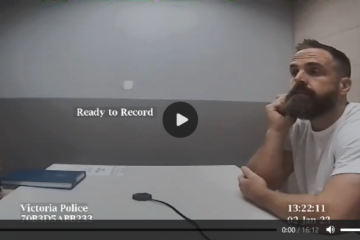i’m going to answer some imagined/experienced criticisms (phrased as questions for my convenience) of this whole globalliberalmediaplease thing (my life), ones i would be very reluctant to answer in person (because of the risk of me becoming extremely emotional/angry and then breaking down crying, maybe saying some really stupid shit in the process).
there is quite a few of them here, and they are all so dishearteningly hell-bent on finding no problem with the current state of affairs (or resisting change by any rationalisation) that it seems almost pointless to engage with them and their theoretical owners — but as i know these things will come up i’ll answer them in the best way i can, through writing in the relative calm of being alone at the computer.
there is a heap more of the shitty things, so perhaps i will answer more soon, for your reading pleasure.
we already have some public media/broadcasters, we have alternative media, there is already a wide variety of views expressed freely in our already liberal society, how is this system inadequate at all? why should an already stretched government budget be expected to pay for a whole network of public broadcasters?
on public broadcasters:
public broadcasters, in the minority that they are today, can have little influence, if any, on what it is that constitutes mainstream political thought, as that is largely set by the corporate/capitalist media which dominate the media that is our public discourse (although there is some variance within the ‘corporate/capitalist media’, i’m going to ignore the differences here for the sake of brevity).
what i mean by ‘mainstream political thought’ is the common (mainstream) mode of cognition/perception in political matters, the framework of thinking, the standard language with all its preconceptions and exclusions.
certain practices within the mainstream (corporate/capitalist) media affect mainstream political thought, such as: issue selection, the framework through which issues are viewed, positive and negative attachments to certain aspects, opinion/belief normalisation/marginalisation, etc. (you would have to write a thesis to cover what this sentence tries to cover adequately — for those theses, see chomsky, mcchesney, as well as other non-north-american scholars)
a minority public media/broadcaster system is largely consumed by the mainstream political thought that is set by the dominant corporate/capitalist media (in this circumstance i’m speaking of the ‘high-end’ corporate/capitalist media: those aimed at the intelligent, educated and somewhat critical (what i might call the ‘liberal’-conservative) component of the public, the same component that public media/broadcasters attract)
a small theoretical and ‘totally far-out’ example:
in australia at least, the mentality of politicians and reporters speaking on the public television broadcaster sets the same limits on discussion/expectation as the ‘high-end’ corporate/capitalist media. any attempts by the public broadcasters to broaden/deepen the thinking/explanations of our politicians (hoping to drag political thought out of the conservative mire and into a realistic, ‘radical’ (i.e. not conservative) diagnosis of current affairs, power structures, etc.) would have limited reach and would exert no major influence on conventional politics because the corporate/capitalist media certainly won’t help them out in that regard. these sorts of attempts to change the framework of political discussion on the public broadcaster would be portrayed/seen as a hijack of the public broadcaster by ‘left wing’ nut-jobs — when really it would only be bringing realism and non-cunty objectives to our paralysed nation-centric, capitalist-appeasing politics.
only when public media institutions are the major components of the mainstream media can they raise the standards of political communication and consistently demand more from politicians, the mainstream framework of political thinking can then escape the narrow state-centred approach that fails to address the democratic deficit in international economics — it can lift its eyes to the real structure of world power right now and how that can be improved for the purposes of global justice and global democracy.
a mainstream of public media, utilising all mediums, can become the credible and well-resourced educational force that our politics needs — by enriching mainstream political thought, bringing reality to the political framework and clarity to political discussion, they might be able to give all of us a reason to seriously engage with politics.
on alternative media:
alternative media, under-resourced and rightly considered fringe, will really only ever cater to the audience that will go out of their way to find news and discussion that they see as a more realistic approach to earthly happenings, for most people the alternative media is too difficult to bother seeking out, of unreliably quality and is often seen to represent the views of ‘crazies’ who cannot get a job in the ‘real’ media (capitalist rags).
alternative media suffers, the same way as public broadcasters do, the inability to effect the mainstream which is generally defined by the historically credible, well-resourced (?) and well-exposed corporate/capitalist media.
despite the beliefs of the hopeful ‘internet age’ folk — who think that the power to publish individually will in-itself lead to a ‘media revolution’ — without the human-hours and resources necessary for original and thorough reporting, the fringe alternative media will always be trying to undo the damage that the mainstream media does with its primary coverage (at best).
freedom to individually publish is definitely a good thing, giving a voice to absolute maniacs such as myself and hopefully allowing a few dissenting voices to hit the mark, but huge systemic reforms to our media can achieve progress that the existence of individual publishing, alternative media, or minority public media can not achieve from the fringes (but can hopefully help to push for).
for liberal democratic rationale and compassion to become the basis of mainstream political thought, the end of corporate/capitalist media domination and its replacement with a public media system of integrity would be a huge step in the right direction.
on our already existing liberal, free-speech society:
yes, our society is good in that it allows anyone to say anything, believe anything, but when corporate/capitalist media organisations have decisive influence on which ideas and opinions will be considered credible, realistic and mature, a clever defeat of the potential power of free-speech and free-thought has been carried out, all the more effective for no one believing that such a thing has happened.
real freedom of speech needs a public media system mandated to the aim of real freedom, real political equality world-wide — anything less is totally unsatisfactory and will continue to have deadly and destructive consequences across the world.
on budgetary concerns:
our global community can definitely handle the provision of a publicly accountable mainstream media system, when you consider that company ‘profits’, surplus funds effectively fleeced from our community, have always been paying for the corporate media (which itself ‘profits’ hugely), the economic question is just one of restructuring, right-shifting.
with a better system, not only will the community not be paying billions for a bunch of absolute wankar bullshit-artists (advertising ‘creatives’), the media can be run not-for-profit (putting great services first), paying appropriate wages to all and ridiculously high wages to none.
supposing the truly liberal media system did progress, it would afford us the power to take back much of the ‘profits’ that are swallowed and squandered presently by the privileged minority, more money for the community and less for the stinking-rich-prats will certainly alleviate the budget pressure felt by so many countries.
it might even be best for the united nations to collect tax from multinational corporations, using some of those funds to set-up and continue to fund the global level of public media provision, only leaving nations to provide national and local level media.
well i thought you didn’t believe in a corporate/capitalist mainstream media conspiracy? it sounds like you are saying the corporate/capitalist media serves the interests of the business world, deliberately marginalises opposing views, and tries to keep this a secret from the public, isn’t that the definition of a conspiracy?â
i said i don’t believe that there has been, or is, a centralised, deliberate conspiracy to produce the mainstream media system we have today, i believe the system we have has developed out of individual, self-willed actions over at least the last century, but i do believe it ends up having effects that predominantly serve the interests of the business world.
the actions of millions of people possessing a corporate/capitalist ideology within our media results in what could be described as a kind of structural, coincidental co-operation of millions — each acting on their own initiative according to their own similarly warped values/world-view, over time producing a system of generally accepted beliefs and practices which serve capitalism.
the corporate/capitalist media system may not be in unison in every regard, but when it comes to certain beliefs and structures that are fundamental to corporate/capitalist operation, they do a good job of keeping questions and questioners well out of the picture, and, therefore, well away from credibility.
as the established corporate/capitalist mainstream media system has developed, it has shaped the thinking of the next generation, leading to a further crystallised acceptance of our governing monotheism:- the economy is our vengeful god which is beyond the control of mere mortals — the economy hurts those nations who fail to please it — to intervene in the operation of the economy in the name of justice is to defy god, we can only intervene in order to show nations how to please god — only token monetary intervention to shut up (and keep busy) those bleeding-heart ‘lefties’ is acceptable (hyperbole deliberate and accepted as hyperbole).
the corporate/capitalist mainstream normalises an anarchic, forever-untameable-mess view of global affairs, it casts the spectator mentality as the mature and reasonable one and it pretends that without the ‘liberty’ of go-getter/taker capitalist sociopaths, bong-smoking-dead-beats on welfare will spread like the plague, drawing dick-and-balls’ on anything they can while they’ve managed to be off the couch.
the result of the above mentioned bollocks is the cynicism and self-oriented politics that are widespread today in the rich democratic countries, the ones that actually have the collective power to unfuck the world.
inversely, i think the general beliefs necessary to solve our collective problems will require generations to take an unshakeable hold.
a publicly accountable media (of contractual and constitutional integrity) that was started tomorrow will still be influenced by the current mindset, and the public will of course have the right to demand that people of that mindset remain employed/represented in the public media.
only over a very long time can reason, compassion and justice come to dominate our politics and invalidate the commonly held beliefs of today (or maybe i’m not giving us enough credit).
so what you really want is state media? you want a media system like that of the chinese or russian regimes and you think that will increase our freedom?
i really do think it is ridiculous the way those within our established corporate/capitalist media speak of ‘state-owned’ media as something that is obviously biased, that you’d have to be a fool to take at face value, while they (with their capitalist/corporate/for-profit structure and their dependence on capitalist/corporate advertising) are self-assured in their purity and freedom to pursue perfect freedom — i’d like to see them refer to themselves as capitalist-owned media.
our media is beholden to a power that is greater than any state, but to see that as an unacceptable conflict of interest (i’m discovering) is seen as some sort of delusional, obsessive disorder.
i don’t want state/government-controlled media, i want a media that is publicly funded (yes, the money will be handed over by the government, those administrators of the public will, at the publics behest), publicly ‘owned’ (whatever that means) and publicly accountable.
i don’t hear the same people who would make this sort of criticism/question becoming outraged at the existing ‘state’ justice system, demanding that the only way the justice system can become liberal and stop serving the interests of the ‘state’ is that we ‘privatise’/corporatise the justice system.
i believe that, if we actually have a future of enriched democracy on this planet, people will look back at this stage of media ridiculousness and wonder why the fuck we put up with this obvious bullshit for so long (considering the damage it has done to the planet they must live on, they would have every right to be a little bit angry).
so aren’t you just saying we should establish a media system, with public money, that will serve the interests of your political philosophy? you want a liberal propaganda machine and the elimination of all competing voices through legislation that restricts the rights of others? that sounds like the reverse of ‘liberal’ to me.
i am certainly not arguing for a media that is biased toward anything other that what our society is purported to be based upon — liberal democracy — and all the equality, respect and critical analysis that that implies.
having democracy, justice, human rights and sustainability as goals, the media system i propose would be bound to critically analyse all points of view and provide the information and skills for citizens to think for themselves and make their own decisions (that’s the definition of education, education being the opposite of propaganda).
it is true that i believe such a system will increase the awareness of many of the concerns i have, and hopefully increase the importance of these issues in many people’s minds.
i am certainly not an ideological warrior, attempting to use the currently accepted conception of good to somehow smuggle in my own hidden dogma, i don’t know, or think it is possible to know, the structure that will bring the best results, it will be up to all of us to experiment, assess and re-structure, probably indefinitely.
i consider my own political beliefs as unfinished, underdeveloped and subject to further revision, error correction, etc. — the only thing i know myself to be committed to liberty, democracy and justice (ignoring the often distorted definitions of those terms).
my hope for a liberal media system is a system that will help us all to make the best political decisions that we can, together — i believe in the right to an opinion formed by the individual after the best possible education, and i believe in an equal share of political power.
what i want is actually the end to propaganda in our news media, a sole focus on education and the selection of ‘newsworthy’ news items based on estimates of relative importance to our global community (estimates made on grounds that are generally accepted and basically incontestable to anyone except a massive prick/psycho).
conservative servants of the capitalist philosophy are the ones who wish to maintain a media system that fails to critically analyse the present state of affairs, instead using any trick of diversion, manipulation and confusion that will result in the acceptance of their will.
they have become so used to a system dominated by these kinds of media organisations that they cry bias whenever a media outlet is not completely biased in their direction – even some of the ‘high-end’ established capitalist/corporate media is considered to be ‘liberal-biased’ to them, even though the ‘high-end’ play their role in the continuation of the status quo.
how are people going to know what they want and how to get it if there is no advertising? how are struggling small businesses going to get business if they are not allowed to advertise?
the return to critical thought about what is wanted and necessary is something i believe would be very helpful to our consumer-mad culture in this time of depletion and destruction of the ecosphere.
the idea that we won’t know what we want is totally ridiculous to me, we are far more likely to know who ‘we’ are and what ‘we’ want with the entry of calm critical assessment in the public sphere.
small businesses that don’t have the money to advertise will probably benefit when the practice is abolished and products and services are subject to a real analysis of existing properties.
attempts by anyone to increase business will have to focus on actually improving their product or service rather than indulging in extensive/intensive psychological-brain-invasion, which i believe will benefit us all.
any new products can make their way onto the market through the appropriate retailers/avenues and if they are adopted it will be on better grounds than much of the crap that gets up today.
it will be easy to make sure information on products and services are easily available to anyone who wishes to find out (in a process that is fair to all providers, regardless of wealth) and we won’t have a problem, we’ll have gotten rid of one.
“what about sport? what’ll happen to it without corporate sponsorship? if you want to reign in the ‘rich-pricks’ who’s going to own the teams?”
great priorities and great point.
that really stumps me, i see no way sport could go on without the continued dominance of integrated world capitalism.
no more questions for now please.


